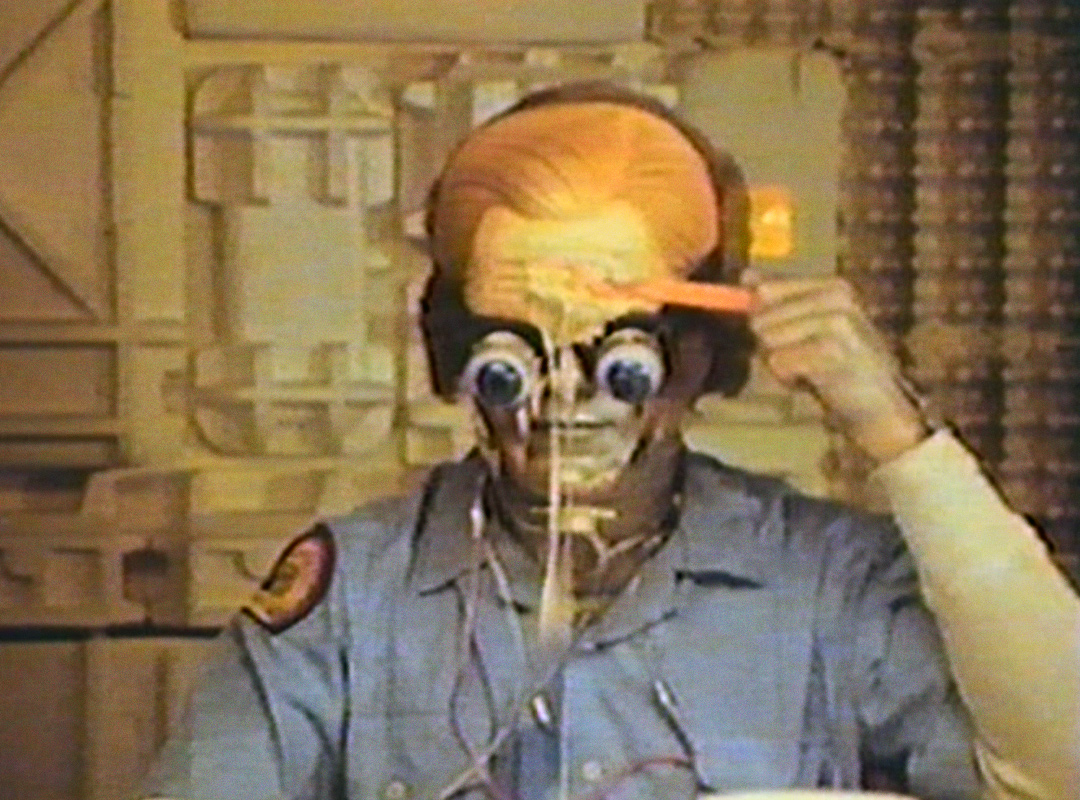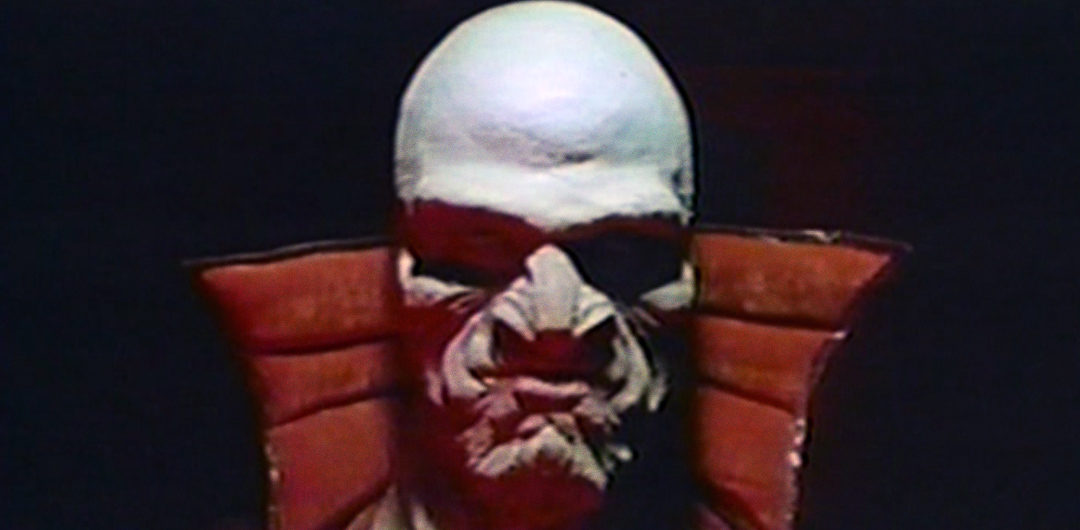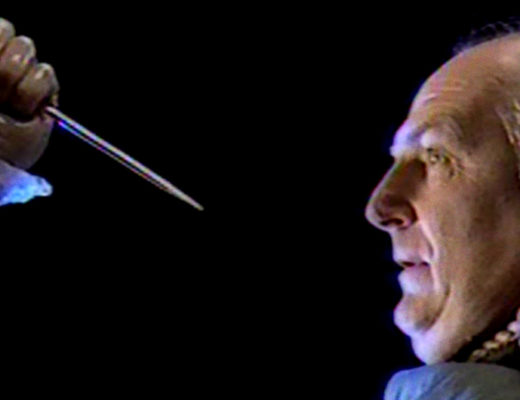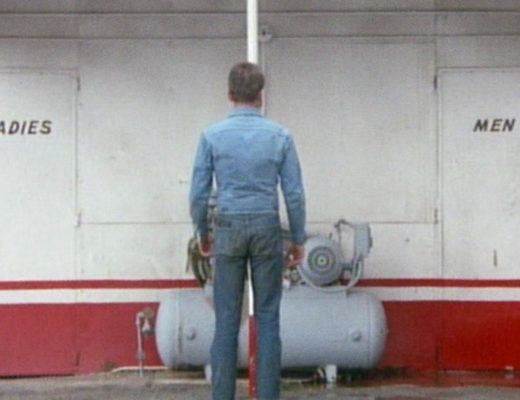Two film critics sit in a dark theater, just like Siskel and Ebert, only their names are Phillips and Brill. Phillips leaves the top four buttons of his shirt open so you can better see the dark wisps of chest hair on his pale, sunken chest. He gazes into the camera.
“Science fiction. What do you think of when you hear the term? Space? Robots? Martians taking over the world? French toast? Portugal?”
With a 16% unemployment rate, I can assure you that Portugal does not care about science fiction. French toast also does not care about science fiction.
Brill peruses a dictionary and figures out that “science is the study and observation of facts . . . and fiction is the rubbing of one body against another. So I guess science fiction is the observation of one body rubbing against another!”
Phillips shakes his head. “Fiction, fiction, like a book! You were looking up friction!”
Two minutes and thirty-five seconds into the movie, and I’m already considering shutting it off. I know that life doesn’t have to be like this. But I soldier on, because there’s always a small part of me that wonders, wait, what if this movie gets really good later on? I realize a very, very small percentage of trash does this, but it’s the same reason why people buy lottery tickets. Maybe this is the one!
Brill and Phillips introduce four science fiction shorts—one is great, one is good, one is acceptable, and one is woefully stupid. Brill and Phillips themselves are also woefully stupid. At one point they make shadow puppets on the projection screen, spill hot coffee on each other, and rue the fact that they don’t have sandwiches.
In “Dr. Dobermind,” Jenny and a group of young girls go on a field trip to a museum. There’s an impressive display of stuffed animals, including a wild cat that looks just like the one in Gruesome Twosome. The students meet Dr. Dobermind, who is slicing open an animal to prepare it for display. The teacher chats excitedly about animal livers. It is a weird field trip. In first grade, we took a field trip to Pizza Hut. That was pretty weird, too. Dr. Dobermind singles out Jenny and stares at her intensely.
“In my laboratory animals are nothing more than molten jelly-like lumps of rotting flesh.”
Jenny is seized with terror. Suddenly, Dr. Dobermind begins appearing everywhere around her. In her closet, in her reflection in the mirror, and in the Häagen-Dazs shop, where he names off today’s flavors but warns that there is no soda.
“Dr. Dobermind” has a sense of fun and plays with tropes without turning the whole thing hokey. The plot is simple and streamlined and dialogue is used sparingly. I love that it’s not overly ambitious. It’s just a charming, skillful jewel that delivers. Plus, Jenny’s nightstand drawer is lined with Incredible Hulk comics.
In “Illegal Alien,” a group of beer-drinking, dope-smoking, arm-wrestling astronauts wake up from deep space hibernation. There’s an android who opens a centerfold of a mechanics magazine and says “Oh baby, check out those diodes.” Meanwhile, the captain of a ship gets a message from his mother, who says if he had just applied himself he could’ve been a doctor, lawyer, surgeon, or pedophiliac.
The astronauts land on a planet and find eggs. No good things have ever come out of eggs in a science fiction movie. A label on the eggs says, “No preservative added.” Then there is a killer clown in a sombrero.
“Illegal Alien” is the exact opposite of “Dr. Dobermind.” It’s hokey and dopey and convoluted. It’s an excruciatingly unfunny and pointless parody of Alien. It’s a lot like watching an improv troupe fail and feeling embarrassed and ashamed on behalf of all the actors. Germans have a word for this feeling, of course: fremdschämen. “Illegal Alien” is fremdschämen perfected and distilled into seventeen extremely long minutes.
In “Nightfight,” a young boy named Zach listens to a scary story and begins to see shifting shadows in his bedroom. He hears creepy noises and menacing growls. Could there be a monster under his bed? Eventually Zach’s older brother Barry, who is a jerk, gets eaten, as does his dad, who is an even bigger jerk. Plus the dog gets eaten. The dog is not a jerk. “Nightfright” is acceptable, but all together forgettable. Its tropes are exactly that—tropes. It’s not ambitious or passionate or even thrilling, but it’s cohesive and clear. There’s not a lot of inventiveness, though I do appreciate the attempt to capture the terror we all had as young children being afraid of the dark.
In “The Thing in the Basement,” some dudes play penny-stakes poker and bicker when suddenly a flaming meteor falls from the sky and lands into the basement. A “thing” shoots fireballs and reeks havoc, but lucky for the dudes there are rifles mounted to the walls, including a rifle and an assault rifle. Though technically, yes, all rifles can be used for assault. Unfortunately the “thing”—a greenish monster with an outfit that could only be described as “disco”—is impervious to bullets. “The Thing in the Basement” is a nod to 50s sci-fi schlock where aliens demanded to be taken to our leaders. It succeeds where “Illegal Alien” failed. The ending is goofy and ludicrous, but somehow it works, even though it really shouldn’t.
The best part of Cinemagic is that it’s sixty minutes long. It’s even shorter if you fast forward.






